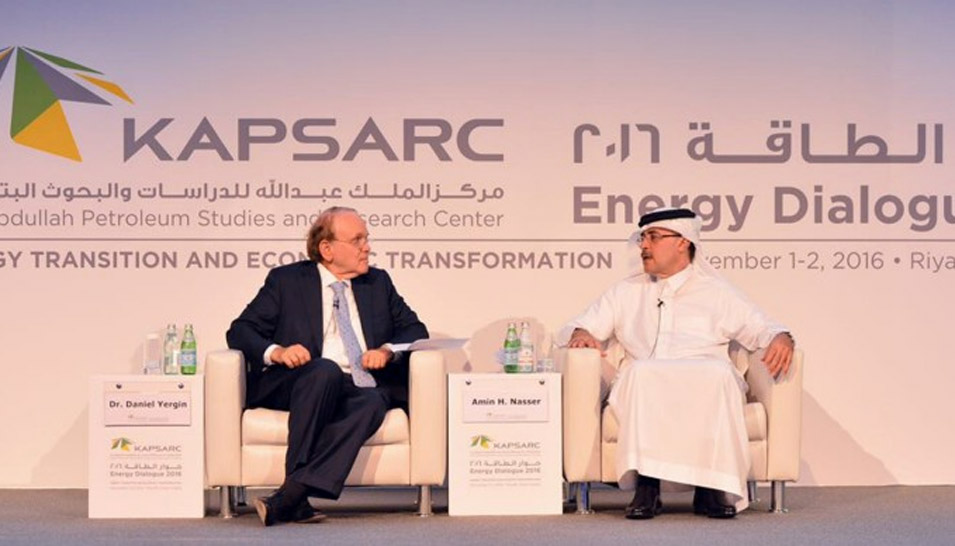
- Addressing climate change is a critical imperative for Saudi Aramco.
- Collaborative research, technology and innovation are vital for the global energy transition to be successful.
Reconciling the priorities of supplying reliable energy to the world while also addressing climate change was the focus of a keynote speech by Saudi Aramco President and CEO Amin H. Nasser today at the King Abdullah Petroleum Studies and Research Center (KAPSARC) Energy Dialogue Conference in Riyadh.
“The role of energy in global economic development is undeniable, but so is the environmental sustainability of the planet. For Saudi Aramco, addressing climate change is a critical objective,” Nasser said in his keynote.
Noting that there’s a direct link between energy, economic prosperity and living standards, Nasser cited the per capita, per year energy consumption of India, China and the U.S., adding that in 25 years, global average of energy consumption per capita is expected to remain substantially unchanged from present levels. While the global population will increase, the efficient use of energy will help moderate emission levels. “Fortunately, under this scenario, CO2 emissions are projected to grow by less than 14%, or roughly half of the rise in energy consumption.”
Nasser outlined the key strategies Saudi Aramco is pursuing to minimize the carbon footprint of energy. Climate change is driving the transformation of the global energy system, but to be successful, there’s a need for alternatives to be ready to reliably and economically meet growing world energy demand, he said.
However, Nasser added, “pragmatism demands that sufficient investments must continue to be made in oil and gas during the long transition. And at the same time strong emphasis needs to be placed on minimizing the carbon footprint. The Kingdom is fully committed to the goal of clean energy, and climate change is a top priority.”
Nasser cited the Global Methane Initiative, Mission Innovation and the Carbon Sequestration Leadership Forum, or CSLF, as examples where Saudi Arabia is part of the global mission to address climate change and reduce greenhouse gas.
Saudi Aramco is pursuing a comprehensive carbon management strategy: helping to support the Kingdom’s efforts in energy efficiency that is focused on all end-user sectors; expanding gas supplies; focusing on developing renewables; and boosting research and development of win-win technologies that could dispose of carbon while turning it into beneficial products.
Nasser said that Saudi Aramco is pursuing partnerships in carbon management initiatives. “Collaboration is an area of vital importance, and Saudi Aramco recognizes the power of partnerships.”
Saudi Aramco also plans to invest in renewables as the Kingdom diversifies its energy mix, Nasser disclosed. “In renewables, we plan to play a role in helping the Kingdom achieve its ambition to become a solar powerhouse,” he said.
Nasser said that, as part of a leading industry response to climate change, Saudi Aramco has partnered with nine international oil companies to form the Oil and Gas Climate Initiative, or OGCI, whose members represent 20% of the world’s oil and gas production.
In his speech, Nasser called on the King Abdullah Petroleum Studies and Research Center (KAPSARC) to “make an important contribution on climate change knowledge and research and create greater value for the Kingdom through value-adding research and studies in a range of areas, from monetization of the Kingdom’s resources, to studies on economy, energy, social issues and trade.”
After his remarks, Nasser participated in a panel discussion with Daniel Yergin, Vice Chairman of IHS Markit, renowned historian and author of the award-winning books “The Prize” and “The Quest.”
The two-day Energy Dialogue conference, held at KAPSARC's Conference Center, under the theme “Energy Transition and Economic Transformation,” was designed to help shape energy economics and policy insights that will impact the well-being of societies. The event offered an opportunity for high-level interaction on the challenges and new opportunities around the global energy landscape. KAPSARC’s Energy Dialogue was attended by senior energy and economic policymakers, experts, researchers, and civil society from several countries.